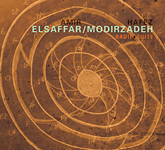|
|
 |
Dusted Reviews
Artist: Amir ElSaffar and Hafez Modirzadeh Album: Radif Suite Label: Pi Recordings Review date: Mar. 23, 2010 |

|
|
|
 |
Fifty years since the release of Ornette Coleman’s Free Jazz, the language of avant-garde jazz has barely changed. Perhaps the biggest shift is simply the loss of shock value. So what can two jazz composers in 2010 possibly accomplish by imitating Coleman or Don Cherry’s styles?
Amir ElSaffar and Hafez Modirzadeh, composer/co-leaders on Radif Suite draw on the timbral aesthetics as well as the modal vocabulary of the dastgah in Persian classical music, though their approach is a “dis-integrative” one, concerned with coexistence, re-assemblage and malleability of the various models they use. The album presents an ambitious project that investigates the possibilities of order and freedom in musical systems. In ElSaffar’s words, he’s looking for “a human spirit larger than any singular source imagined.” Listening to Radif Suite quickly proves that binaries like East and West can only provide at most a limiting critical paradigm. What’s most exciting about this album of two multi-section pieces for a jazz quartet, is not the fact that it successfully fuses “East and West” — which, on its own is a well-beaten, tired artistic path — but the way it makes you hear the past differently.
In the beginning, Hafez’ Radif-E Kayhan (Persian for “row of the malleable universe”) doesn’t point to any particular tradition, Persian, American, or otherwise. The introduction of bent pitches and microtones that don’t belong to the well-tempered scales of the European tradition could possibly be heard as originating from the dastgah, but it’s not clear. Then, through a fast-paced joyful little frenzy, the note bending and microtones suddenly become part of a Coleman-esque vocabulary of composition and ensemble playing style.
The interfacing of a Coleman-inspired musical method with the dastgah and a meticulously worked-out but open method of modal composition brings to focus elements of free jazz, and in particular Coleman’s style, that have too long been characterized as “naïve/childish,” “nonsensical,” or “out of tune,” whether dismissed or revered. Heard through the dastgah system, where “out of tune” scales are not only legitimate ones, but pitches in modes imbued with affective meaning, Modirzadeh and ElSaffar’s interpretation of Coleman’s tonal language becomes the opposite of naïve, childish, or nonsensical. Instead, it’s a language that’s supersensitive to the subtleties of manipulations of pitch for a single player, and disjunctures of micro-rhythm between players for very intentional formulations of a certain thought or mood. Imitation in this case is not the limiting kind, but an inspired process that celebrates teachers and listening histories in the present.
The “Copper Suite” by Amir ElSaffar bears striking similarities in style to Modirzadeh’s, especially for ensemble playing and treatment of pitch material. Hearing the two along side each other makes it clear that the two composers spent many hours together collaborating to develop a new grammar for composition and improvisation. With its sweeping melodies unbound to meter, ElSaffar’s “Copper Suite” takes on more of the Don Cherry aspects of post-bop improv, but the two pieces share more continuities than differences, and the album as whole seems to work as one large suite consisting of two different aspects, each with its own smaller facets. In both cases, the lines between pre-composition, improvisation, performance, and ensemble melt together.
By Miki Kaneda
|







